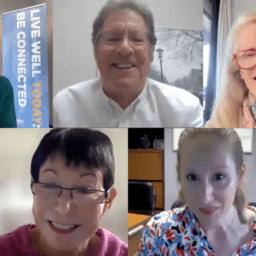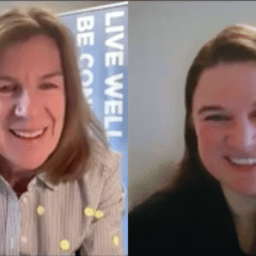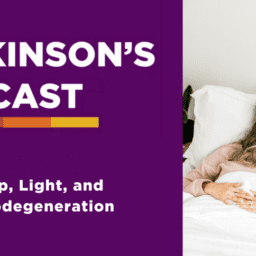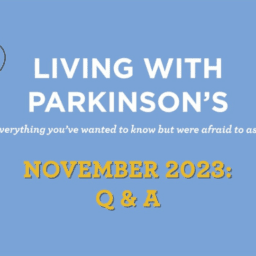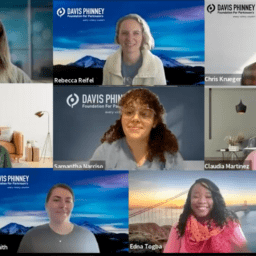Notes From this Month’s Meetup
Written by Connie Carpenter Phinney
Preliminaries
On December 5, we had our final Care Partner Meetup of 2023. Before diving into the main topics for the month, we opened a few polls for the audience to determine what topics might be important for us to discuss in 2024. As we’ve historically seen, cognition and in-home care are central concerns for most of us in the care partner space; additionally, we’d love to hear from you if you have thoughts or ideas. Please email us at carepartners@dpf.org.
We also shared that two top experts will be featured meetup guests in early 2024. On January 2, 2024, the meetup will feature physician’s assistant Jessica Barr, who works in a movement disorders clinic and whose mother has Parkinson’s. Bring your questions, or just buckle up and join us for the meetup: It’s going to be instructive and informative!
On February 6, 2024, neuropsychologist Mark Mapstone, PhD returns to discuss cognition. We plan to record both sessions to make them available to you. A recording of our last meetup with Dr. Mapstone is available here.
Notes from This Month’s Meetup
This month, we discussed the expectations around family gatherings during the holidays and our limited resource: energy!
Finding Energy and Support from Friends and Family
Early in our conversation, Pat said that after our November meetup, he felt down: “I feel the weight of my household with my wife’s Parkinson’s–and it is her Parkinson’s. I always have to remind myself. It’s hers, not mine. I can’t fix it. You can’t fix your person with Parkinson’s, and they don’t want to have it either.” Pat talked about the need to support others in the same situation and said, “It’s not about me. It’s not about us. It’s about everybody working together.” Pat knew he needed to talk to someone, so he reached out to Gail by telephone. This reminded us how important it is to have someone with whom to connect when things get tough. Pat said that just being able to express himself helped him spin around to more positive thinking.
We ask this a lot, but it’s important to ask yourself: Who is on your team? Who can listen to you when you need advice or support? It’s so important to build a team. Maybe it doesn’t feel like you need one now, but when you do need support, it will be good to know you have a few key people to lean on.
One of our listeners, Suzanne, told the meetup that she had a friend visiting for several days who was able to observe the environment in which she was living. Suzanne’s friend helped her understand that Suzanne needed help and that it was time for her to lean on her adult children. When bringing other family members in, start slowly but don’t exclude them. They do need to know what you’re dealing with. Even if they don’t live close by or have all the time you need, they can be your best allies.
“How are you?”
We discussed the fact that even close friends and family might not truly understand our challenges because our person with Parkinson’s often presents differently in public or when around others.
Someone asked how to answer the well-meaning and familiar query from friends or family: how your person with Parkinson’s is doing. Where do you start? How much detail do you share? And what if they ask how you—the care partner—are doing?
These questions are especially tough when you don’t know where to begin. We’ve said before that routine communication with close friends and family helps them understand how it’s going so that when they do ask, you don’t have to start from the beginning.
Pat said he recently listened to an Oprah interview with Arthur Brooks from their multi-episode series on the art and science of finding happiness, wherein they discuss their shared book entitled: Build the Life you Want. Pat recommended watching the interview and said, “One key is to share your experience with others. When someone asks how you or your person with Parkinson’s is doing, it might be therapeutic to share your feelings.”
It’s also important, when possible, to connect with others in your community who share your experience. You can do so via local support groups, by reaching out to our Ambassador cohort, or getting involved with a local organization near you. Community and connection are crucial for shouldering the weight of caring for someone with Parkinson’s.
Shifting your Attention from the Negative
Gail–who lost her husband to Parkinson’s three years ago–said, “Even when you are having a healthy life, there’s the aging process we are all going through. But when I talk to others and remember what I went through with my husband, I know what you are going through when it gets hard. I know the extreme sorrow and strain.”
Gail also talked about how you must work on ridding yourself of negative thoughts: “You know there’s like this little guy that sits on your shoulder, and it’s the devil, and he’s talking to your ear in your ear–even when you’re trying to relax. A friend told me to say ‘I’m not going to listen.'”
We talked about making a physical gesture—to flick the little devil off your shoulder and tell yourself to let it go. A physical gesture is sometimes how therapists manage the stress, anxiety, and worry they adopt from their patients. Take a breath, exhale, and shake it out down your arms and out of your fingertips.
Stages of Caring
I recently discovered Eurocarers.org and their well-defined list of stages of caregiving.
The Eurocarers website outlines six stages and although these are intended for all carers—not just Parkinson’s care partners—these stages likely resonate with most of us. Have a look to see what stage you’re in and examples of the crucial tasks/actions you can take or emotions you might experience at each stage of being a carer. Of course, not all of us will go through all each stage—and we might blast through a stage or two—but it’s important to create a framework for your own experience, not just your person with Parkinson’s.
Eurocarers encourages “an apple a day,” which they describe as something you can routinely do for yourself to stay healthy and engaged.
This reminded me of Kathleen Crist: our friend and recent meetup guest who has worked with people with Parkinson’s for 20 years and takes care of her mother with Alzheimer’s. Kathleen told us that her go-to device for self-care was to write in her journal. She journals to let go of her frustration and stress. Gail’s “apple” is the small corner of her home where she retreats to read, take a nap, or watch TV.
One of our listeners offered that she listens to podcasts or audio books on headphones while in the company of her person with Parkinson’s. I do this, too, while I’m cooking, but I also have a yoga mat I retreat to almost nightly to stretch out, take a breath, and regain a sense of self.
Make a list of things, places, or activities that give you joy—or at least some relief—so you can take steps toward giving yourself a break.
Self-compassion
Gail always reminds us we are doing the best we can, but it’s not always easy to recognize when you are tired.
During our conversation, Gail observed that in the later stages with her husband Gene before he passed, she perhaps did not have enough compassion for herself. This is important to recognize–even if only in hindsight.
Gail acknowledges that the emotional weight of late-stage Parkinson’s is heavy and that in the depth of fatigue, it is difficult to navigate alone. She said when you give, you must also take; thus, be sure to take time to rest and care for yourself, too.
Pat also offered an end of the year sentiment. He’s been looking back on his life with his person with Parkinson’s and realizes he’s met so many wonderful people because of Parkinson’s and he has been part of the power of the community. It’s imperative for him to have this circle—or, as my husband likes to say—“the tribe.”
We want to encourage you to also find your people: those who understand and are willing to support you. Know, too, that at times you may be called on to use your growing expertise to help them. Helping others feels good and is part of what emotionally sustains us, even when it’s just a simple phone call and show of support. Helping others brings out the best in us; we learn from each other.
Take a deep breath and shake it out. We’re here for you and happy you found us.
Thanks for reading, and take care.
Make sure to check out our recently completed Care Partner Training.
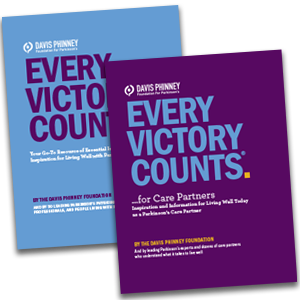 WANT MORE PRACTICAL ARTICLES LIKE THIS?
WANT MORE PRACTICAL ARTICLES LIKE THIS?
Have you ordered your copy of our Care Partner Manual? You can learn much more about living well with Parkinson’s today through our Every Victory Counts® suite of resources. Each manual is packed with up-to-date information about everything Parkinson’s. Click the link below to reserve your manual(s).
Thank you to our 2023 Peak Partners, AbbVie Grants and Amneal, and for their ongoing support of these must-have manuals. Additionally, we’d like to thank Barbara and Dale Ankenman, Abby and Ken Dawkins, Bonnie Gibbons, Gail Gitin in loving memory of Gene Gitin, Irwin Narter, and Lorraine and J Wilson for their generous donations that allow us to make these resources available and free to all.








